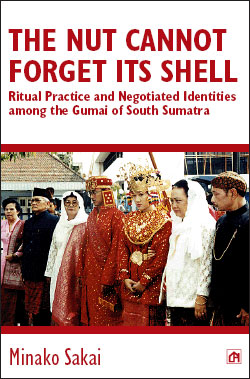The Nut Cannot Forget its Shell Ritual Practice and Negotiated Identities among the Gumai of South Sumatra
This is an ethnographic study of the Gumai of South Sumatra, Indonesia.
The Gumai belong to a Malay-speaking ethnic group that inhabits the South Sumatran
highlands. South Sumatra is known for its numerous ethnic groups, yet until now not much
has been written about the Gumai, or about the Malay-speaking ethnic groups of the South
Sumatran highlands in general.
This book utilises the concept of origin, locally known as asal, which is widely shared among
Austronesian-speakers, to explore issues related to identity among the Gumai. The question of
Gumai identity is not one raised only by anthropologists like the author. It has been raised by
the Gumai in relation to their ethnicity, which lacks a clear cultural representation. The Gumai
share much in common with other Malay-speakers, including the use of local Malay dialects
and costumes. The question of Gumai identity derives from the New Order government
cultural policy, which has promoted a showcase display of distinctive ethnic cultures across the
archipelago. As a result, those who do not possess striking cultural representations have been
left without an acceptable ethnic identity.
What differentiates the Gumai from other Malay-speaking South Sumatrans derives
predominantly from their practice of origin rituals. Their concept of origin (asal ) consists of a place
associated with a particular person who is regarded as their origin. A Gumai village constitutes
an important place of origin. A typical village consists of members who are descendants of
village founders. Such a village has its own burial site for its members, and a monument, which is
associated with an original village location within its boundaries.
A Gumai has to visit a place of origin to hold a gathering known as sedekah. This visit affirms
that he or she has not forgotten his or her asal. To assist them in the practice of remembering
origins, the Gumai rely on ritual specialists, the Jurai Kebali‘an, who is the ritual specialist for the whole
Gumai community, and the Jurai Tue, who is the ritual specialist for each village. Numerous rituals are
regularly conducted by each of these ritual specialists to commemorate specific origins. It is through
the practice of origin rituals that the Gumai can demonstrate their identity.
Despite the importance of origin ritual practices, the Gumai are under pressure to advocate
their commitment to Islam, because conversion to a world religion is a political necessity in
New Order Indonesia. In this light, Gumai origin rituals have been influenced by a process of
progressive Islamisation. This book examines how Gumai indigenous origin rituals have now
been incorporated into Islamic discourse.
In the final chapter, the author considers emergent aspirations among the Gumai to become
middle class in urban areas. Through education, the younger generation seeks employment in the
public and private sectors, and leaves its native villages for urban areas. The success and
hardships in these places, however, brings the younger generation back to its villages of
origin, because their success and hardships are regarded as messages from their ancestors.
The rituals of remembering origins among the Gumai thus continue to dominate their way
of life in changing social contexts.
|
|

AUTHOR:
Minako Sakai
STATUS:
Forthcoming
PRICE:
$49.95
ILLUSTRATIONS:
45 colour and black-and-white
FORMAT:
Portrait; softcover; c. 350 pages
DIMENSIONS:
204 x 135 mm
ISBN:
1863332243
|
|

